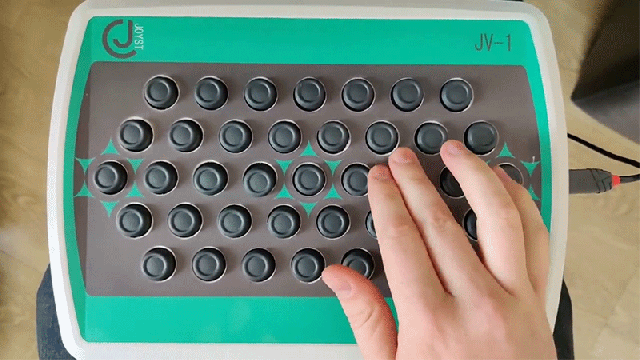More often than not, MIDI controllers take the form of tiny keyboards with a limited number of plastic piano keys. If you know how to play the piano, they’re useful, but if you’re looking for a more creative way to express yourself musically, the Joyst JV-1 replaces piano keys with 39 joysticks from a video game controller that allow for more creative performances.
The Joyst JV-1 was created by Philip Snell, who had become frustrated with the tried-and-true but limited format of MIDI controllers. There are alternatives, like digital MIDI saxophones or Roli’s squishy-key pianos, which offer the additional functionality that Snell was after, including the ability to add vibrato on a key-by-key basis and even bend notes as if you were playing a guitar. But if you wanted to play multiple octaves, even using the Roli meant you had to deal with a large keyboard with limited portability.
Snell’s solution was to replace piano keys with the compact analogue joysticks you’d find on the controllers of consoles like the Nintendo Switch or Xbox One. The smaller footprint meant that Snell could squeeze 39 of them onto a MIDI controller that’s roughly the size of a closed gaming laptop, but without having to trade functionality for portability. In fact, the outcome with the Joyst JV-1 is just the opposite.
The 39 joysticks cover two full octaves of tonal range, but that can be doubled to four octaves by pressing on a joystick before moving it around, which makes the resulting note sound two octaves higher. Pushing each joystick in any direction triggers a specific note, but they can each be wiggled back and forth to produce a vibrato effect, and even rotated left and right while pressed to bend the pitch of the note up or down. The JV-1 can also facilitate aftertouch, where additional effects are applied after a note has been sustained for a brief amount of time. It’s all made possible through the MIDI Polyphonic Expression (MPE) specification that allows digital instruments to behave more like acoustic instruments through nuanced performances that can control various aspects of each note.
Snell is going the crowdfunding route to help bring his creation to the masses with a Kickstarter campaign that seeks to raise just shy of $US15,000 ($20,924) to help push the JV-1 through the manufacturing process. The earliest contributors to the campaign can score the instrument for around $US300 ($418), while those who prefer to wait can expect to pay closer to $US530 ($739) once the JV-1 is in full production. The timeline, which expects to see the earliest backers getting their instruments in early December, sounds a bit optimistic given the logistics challenges still facing even huge corporations during the pandemic. As with any crowdfunded product, a leap of faith is required, as well as a lot of patience should delivery dates get pushed into 2021.
